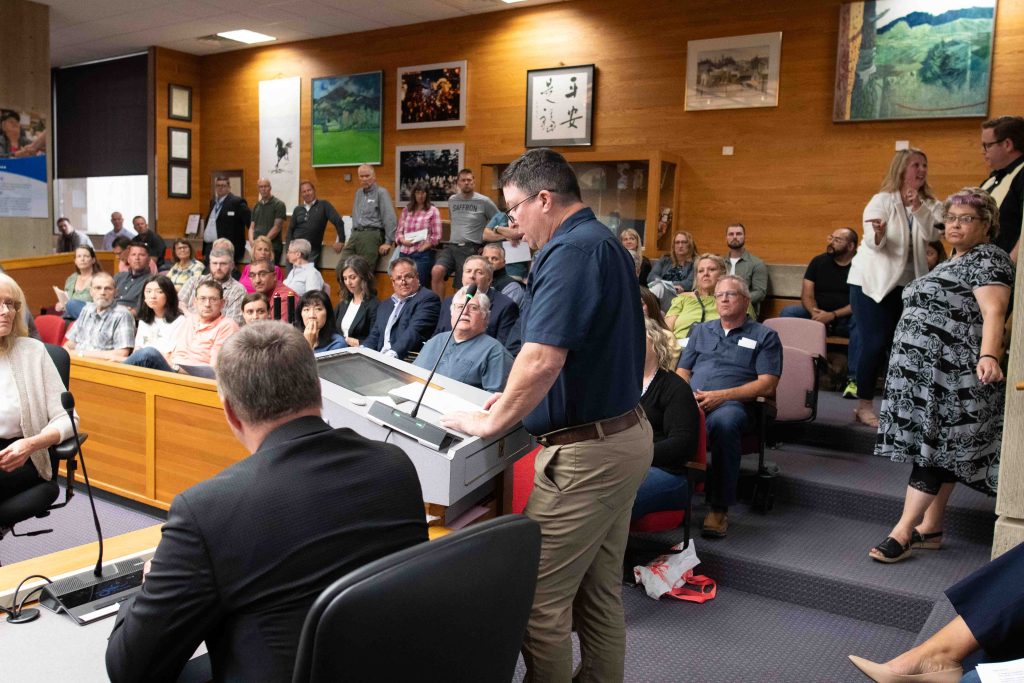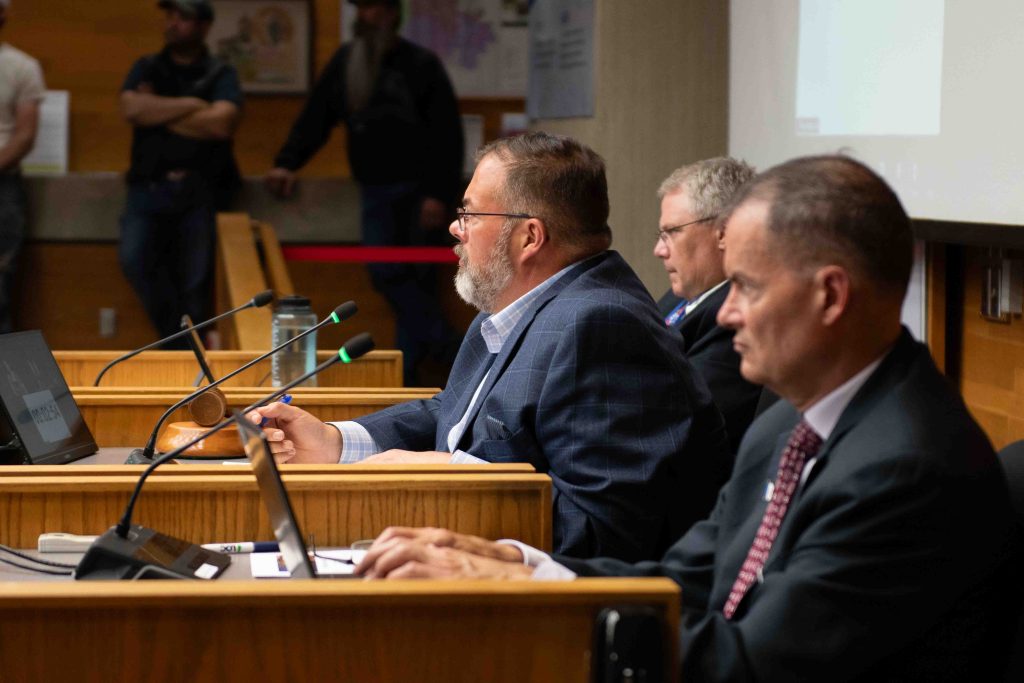Salemites have many questions about the Salem’s city budget woes and proposed payroll tax.
At Salem Reporter’s Town Hall last week, one supporter and one opponent of the tax addressed the audience, made their case and responded to questions from the audience.
Salem voters will receive ballots in the coming days for the Nov. 7 election.
While time that evening prevented us from addressing every question, Salem Reporter has compiled answers to many of attendees’ queries based on city documents, public statements from councilors and city employees, follow-up conversations with representatives from both campaigns and previous reporting.
HOW DOES THE TAX WORK?
Read Salem Reporter’s previous guide to the tax here.
Is overtime (time and a half) included in the payroll tax?
Yes. As written, the tax applies to all wages earned within city limits.
I’m retired and on fixed income. Do I have to pay the tax?
No. The tax applies to workers with jobs within Salem city limits making above minimum wage. Pensions, Social Security and other non-wage income are not taxed.
How many workers will the payroll tax effect?
The city doesn’t know. Estimates of how much revenue the tax would generate are based on data from the state Department of Revenue, which includes all wages paid by companies with a Salem business address. That data is a best estimate of wages potentially subject to the tax, but it doesn’t break out the number of workers. For more detail on how the city estimates tax earnings, see our article here.
What will it cost and how many people will be staffed to implement the tax?
City Chief Financial Officer Josh Eggleston projected $1.3 million in annual costs to add seven employees to administer the tax, according to city calculations.
That includes three tax analysts, an administrator, accountant, program analyst and communications specialist. The communications specialist and one analyst position were added because of the minimum wage exemption, which Eggleston said increased the complexity of the tax and the need to increase communication with employers.
Is the tax calculated for net earnings after state and federal taxes or gross?
The tax ordinance specifies employees would pay 0.814% of wages earned. There’s no deduction spelled out in the law for state or federal taxes.
Why not follow the Eugene model?
Salem’s payroll tax has drawn comparisons to a similar tax the Eugene City Council imposed in 2019. Eugene taxes both employers and employees and bases the tax on the employer’s location in Eugene. The tax rate on employees is lower than Salem’s.
City leaders discussed focusing the tax on businesses based in Salem, something easier to track with state data, but ultimately decided to use work performed in Salem after seeking advice from the city’s legal office, City Manager Keith Stahley told Salem Reporter in August. Tax law generally requires a level of contact between the government imposing the tax and the person or entity paying it, and city leaders felt the connection was too tenuous for workers who never set foot in Salem.
Salem also can’t legally tax the city’s largest employer. Cities can’t tax levels of government above them, which means Salem can’t impose a tax on Marion County, the State of Oregon or the federal government. Their employees can still be taxed on wages. About one quarter of Salemites work for state government, and the county and federal government are also large employers.

HOW DID WE GET HERE?
Is there really a deficit?
Yes. Salem’s general fund, which pays for core city services like police, fire and parks, is spending more than it takes in and would be out of reserves by fiscal year 2027, according to a city forecast from September. City staff say the core issue is that the cost of paying people and buying needed materials grows faster than the revenue from property taxes which cover most of the city’s general operations.
The city budget for the current fiscal year projects $186 million in expenses and $170 million in revenue. That means a $16 million gap between expected city spending and revenue, which would be expected to grow in subsequent years as the cost of employees and materials grows faster than property tax revenue.
City employees have been anticipating and talking about this expected deficit for years, and said repeatedly during the budget process in 2022 that the city could not go forward after that without substantial cuts or a new source of revenue.

What has been cut already?
The city most recently made substantial cuts to city services in the years following the 2008 recession, including eliminating the community service department with 73 employees in 2010 and closing two fire stations in 2013. The fire stations were reopened in 2017 and 2019, paid for by drawing down city financial reserves. City employees proposed cuts to library hours, parks maintenance, police, fire and homeless sheltering programs if the payroll tax does not pass.
City staff and councilors say that city residents are getting reduced services now because Salem has not added enough employees in fire, police, planning and other departments to keep up with the city’s growing population. The result is longer wait times for emergency response to calls, permit approval and other city functions.
What did the city spend Covid money on?
Most of the money from Covid relief programs went into the city’s general fund, allowing the city to delay budget cuts or seeking new revenue. That consumed about $12 million, according to a city budget report. The city did add homeless services with another $8.1 million in federal relief funds.
Salem voters already approved property tax increases in 2018, and an infrastructure spending package in 2022. Why does the city need more money?
Salem takes in money from many sources, including utility bills, property taxes and grants from state and federal sources. Much of that revenue is restricted to specific uses, however. The city can’t use the money residents pay for water to then pay for police.
Voters approved two bonds that increased property taxes in 2017 for specific purposes — one for $61.8 million to to build the new police station and $18.6 million to seismic retrofits of the library. By law, that money can only be used for those purposes and can’t be used for other city costs, such as police officers.
In 2022, voters approved a $300 million bond to pay for road and sidewalk repairs, street construction, new fire trucks and equipment and more That money can’t be used for any other purpose, such as paying firefighters to operate the new trucks.
Why are the police struggling to hire?
The Salem Police Department said it had 23 vacancies as of Oct. 11. Police Chief Trevor Womack points to nationwide recruiting and retention challenges, retirements and understaffing as factors.
WHAT OTHER OPTIONS ARE THERE?
What other options are possible?
City councilors considered other options including a payroll tax, an increase in the city’s operations fee, and raising property taxes. Councilors discussed the options in depth during a February work session, and decided to raise the city’s operations fee as part of the 2024 budget.
Members of Salem’s Citizen Budget Committee, the majority of whom supported the payroll tax, told Salem Reporter in September about a variety of supplemental options that interested them. They included updating the operations fee on monthly utility bills for large, commercial and industrial clients and diversifying the city’s economic base.
Preston Mann, political director for Oregon Business and Industry, said during the Town Hall he prefers a tax levy because it’s subject to regular voter approval. Council President Virginia Stapleton said city leaders opted not to pursue that option because state law caps the total taxes all local governments can impose on a property. The effect, she said, is that if Salem imposed a levy, many properties in Marion County wouldn’t pay the full amount because they’re already being taxed at the maximum rate allowed by law.

Why not raise participation fees to cover the gap?
That’s one option city staff proposed as part of a budget cuts package the city council is considering should the tax fail. An increase in fees for parks reservations, Center 50+ services and other parks and senior center programs would raise city about $800,000 — a fraction of the expected $16 million gap.
Why not do an outside audit?
The city’s budget and financial reports are audited annually, and that audit is included as part of the city’s annual financial reports, which are posted online here. The audits cover whether the city is following laws and requirements for grants, but don’t dig into how the city chooses to spend money or the services it provides.
The city retained consulting firm Moss Adams to compare Salem’s services and budget deficit to other Oregon cities. The consultants reported that Salem was understaffed and spending less per person on most city departments than comparable cities. Read more about the findings here and watch a council discussion here

What asks has the city made to the state to supplement land/emergency service use, and how has the state responded?
As the state capital, Salem has a large amount of land that’s owned by the state and not subject to property taxes, a unique challenge for the city’s budget. The city also has police, firefighters and emergency medical personnel respond to state facilities, like the Oregon State Hospital, raising the cost of those services. The state provides no reimbursement.
City leaders said they’ve raised the issue of the state contributing to the Salem city budget multiple times at the Oregon Legislature and with state leaders, with no result. Mayor Chris Hoy briefly served as a state representative from 2021-2022 and introduced a bill where the state would pay Salem. The bill never made it out of committee.
Salem legislators also were unable to secure state funding for city homeless services during the 2023 session, in part because negotiations over the state budget were held by legislative leaders behind closed doors. No Salem legislators hold leadership positions..
More recently, Governor Tina Kotek said she won’t support the payroll tax but wants to talk to city leaders about other solutions. “Conversations are ongoing,” city spokeswoman Courtney Knox Busch said this week.
WHAT COMES NEXT?
What accountability will there be to ensure funds are spent responsibly?
Salem’s tax ordinance doesn’t outline a mechanism for audits or oversight of the tax revenue, but the city’s budget is subject to both public comment and audits. State law requires cities to have an annual audit of finances. Decisions about how to spend tax revenue would be part of the city’s budgeting process, which include discussion by a citizen budget committee and the city council, with public hearings part of the process.
Asked about an audit mechanism, Stapleton said the council could create one if citizens request it. “The council’s open for anything. We are all about increasing transparency and civic participation,” she said.
Eugene’s payroll tax ordinance requires both an annual audit by an outside auditor and an annual report from a Citizen Advisory Board on how tax revenue was spent.
How did the city choose its planned cuts?
If the payroll tax fails, the city has proposed a series of cuts over the next five years that include closing the West Salem branch of the public library, along with reduced hours and likely layoffs at the main branch. They also include an end to the city funding for homeless shelters, cuts to police and fire positions and reduced upkeep at city parks.
The cuts were drafted using recommendations from leaders in each department, with the intention to maintain core services critical to day-to-day operations without eliminating services like parks and libraries entirely, City Manager Keith Stahley said.
City councilors have scheduled a work session Oct. 25 to continue discussing possible cuts.

Why is the city building more infrastructure and investing in the airport despite budget issues?
In January, the Salem City Council unanimously approved $2 million in terminal renovations to prepare the Salem Municipal Airport for commercial air service, which launched on Oct. 5.
The mayor told Salem Reporter after the vote that city budget issues were structural and included revenue challenges, and that the airport spending wouldn’t “break the budget.” He said the investment would result in more travel to the region and other economic development opportunities.
“We’re working hard to get the (commercial) air service started,” he said in January. “Those things don’t always wait for a budget cycle. And so, we had to act. We understand the implications to the budget, the long-term implications, but the council obviously felt it’s a priority.”
Could this tax increase in the future, or turn into other taxes?
If voters approve the wage tax on the ballot, the tax rate is set at 0.814% of wages.
Salem City Council could decide to raise that rate or impose new taxes or fees in the future, but passing the payroll tax doesn’t give the council any new ability to impose additional taxes. The city council cannot raise property taxes beyond the 3% annual increases allowed by law. A levy or bond, which would raise property taxes, requires a public vote.
Stapleton said the council didn’t put a cap on the tax because doing so never came up during council meetings or public comment. She said the council has no intent of raising the tax rate and hasn’t had any conversations about doing so.
“I don’t think there’s any appetite for the council at all to continue to raise something. We’re here to ensure there’s good governance and critical services people need,” she told Salem Reporter.
If councilors decided to raise the payroll tax or impose other taxes or fees without a vote, Salemites could again refer the council’s decision to voters, as they did for this measure.
Contact reporter Rachel Alexander: [email protected] or 503-575-1241. Contact reporter Abbey McDonald: [email protected] or 503-704-0355.
SUPPORT OUR WORK – We depend on subscribers for resources to report on Salem with care and depth, fairness and accuracy. Subscribe today to get our daily newsletters and more. Click I want to subscribe!












